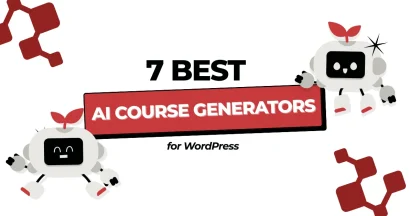There’s no denying the AI revolution sparked by ChatGPT, which famously gathered an estimated 100 million monthly active users remarkably quickly after its launch. But is it the only option for powerful AI chat?
Perhaps you’re hitting the limits of the free tier, need an AI better suited for specific tasks like research or coding (or even to detect AI-generated content using tools like AI Code Detectors), or maybe you’re curious about the growing competition. If you find yourself searching for a great ChatGPT alternative, you’re not alone.
This guide is here to navigate you through some of the most compelling alternatives to ChatGPT available right now, including some fantastic ChatGPT alternatives free of charge, helping you discover the AI tool that truly fits your needs.
Ready to explore?
Eduma – Education WordPress Theme
We provide an amazing WordPress theme with fast and responsive designs. Let’s find out!
Why Even Look for an Alternative to ChatGPT?
While incredibly popular and powerful, ChatGPT isn’t always the perfect fit for every user or every task. Many people start searching for alternatives to ChatGPT for practical reasons. Here are some common motivations:
- Cost: Accessing the most advanced features often requires a paid subscription (ChatGPT Plus).
- Specific Needs: You might need an AI better suited for specialized tasks like coding assistance, factual research with citations, image generation, or integrating with specific software.
- Access & Reliability: The free version can sometimes experience slowdowns or become unavailable during high-demand periods.
- Data Privacy Concerns: Users may prefer tools with different data usage policies.
- Up-to-Date Information: Some alternatives might offer more recent information or better real-time web integration, even on free tiers.
- Different Features or Output: You might simply be looking for unique capabilities or prefer the conversational style of another AI model.
Understanding your specific reason for looking beyond ChatGPT is the crucial first step in finding the alternative to ChatGPT that will serve you best.
7 Top ChatGPT Alternatives to Explore
So, you know why you might look beyond ChatGPT, but what are the actual options? Let’s dive into seven top ChatGPT alternatives that offer unique strengths and are worth exploring:
1. Google Gemini
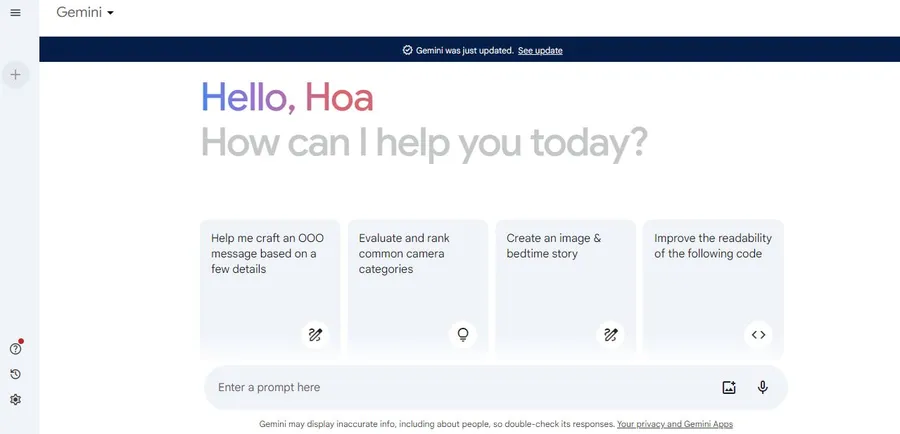
Google’s flagship AI chatbot, deeply woven into the Google ecosystem (Search, Workspace, Android). Gemini excels at accessing real-time information, handling multimodal inputs (text, images, voice), and performing a wide range of tasks from brainstorming to coding help.
Pros: Often incorporates Google’s latest AI advancements, powerful and versatile free tier, excellent for current events and research, seamless integration with Google apps.
Cons: Responses might occasionally feel less creative or conversational compared to others for purely fictional tasks; relies on the Google ecosystem, which has privacy implications for some users.
Ideal User: Heavy Google service users, researchers, anyone needing reliable, up-to-the-minute information and strong multimodal capabilities. A very strong general-purpose ChatGPT alternative.
2. Anthropic Claude
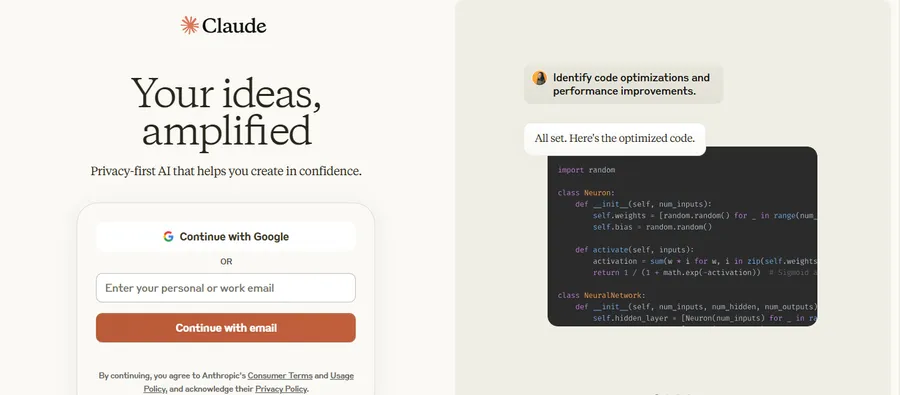
Developed by Anthropic with a strong emphasis on AI safety and ethical guidelines (“Constitutional AI”). Claude (especially the Claude 3 family – Haiku, Sonnet, Opus) is renowned for its strong reasoning, ability to handle very long documents (large context window), and producing nuanced, thoughtful responses.
Pros: Excellent for summarizing and analyzing lengthy texts, generally provides safer and more considered outputs, often has a generous free tier (like Claude 3 Sonnet), great for professional writing tasks.
Cons: Might have regional availability limitations sometimes, top-tier model (Opus) requires a subscription, may feel slightly less ‘personality-driven’ than some competitors.
Ideal User: Professionals, writers, researchers working with extensive documents, users who prioritize AI safety and nuanced communication. A sophisticated alternative to ChatGPT.
3. Microsoft Copilot
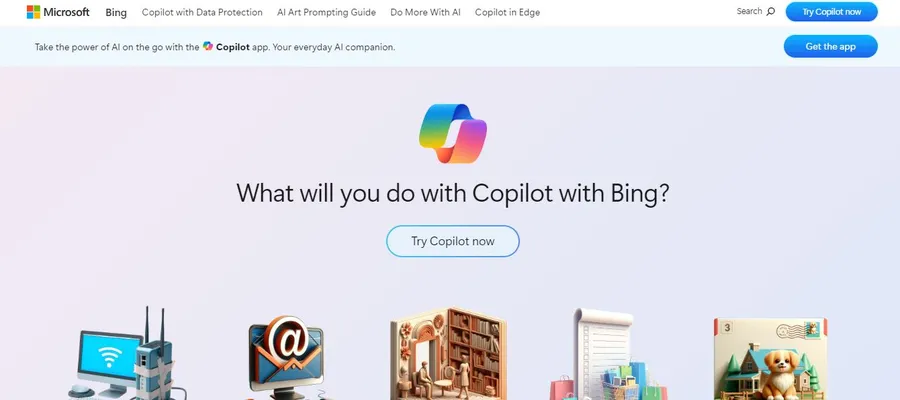
This is Microsoft’s AI assistant brand, often utilizing powerful OpenAI models (like GPT-4 Turbo) combined with Bing search data. It’s deeply integrated into Windows, the Edge browser, and Microsoft 365 apps (Word, Excel, etc.).
Pros: Frequently provides access to cutting-edge AI models for free, excellent integration within the Microsoft ecosystem, includes free image generation (via DALL-E 3), strong grounding in current web information.
Cons: The best experience is often tied to using the Edge browser or being logged into a Microsoft account; its conversational flow and personality can feel different from using ChatGPT directly.
Ideal User: Windows users, Microsoft 365 subscribers, people who want AI help seamlessly embedded in their OS, browser, and productivity apps.
4. Perplexity AI
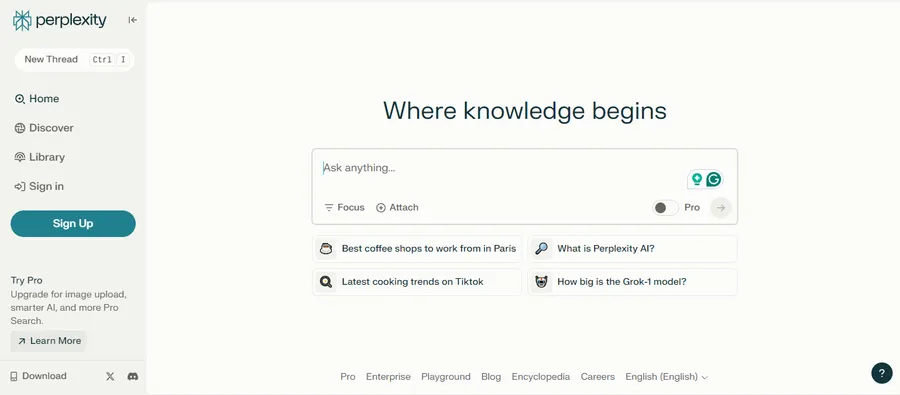
Positioning itself as a “conversational answer engine,” Perplexity AI is specifically designed to provide accurate, verifiable answers to questions, complete with citations and source links.
Pros: Outstanding for research and fact-checking, clearly cites its sources, allowing for verification, offers different focus modes (e.g., academic, coding), clean interface, and effective free tier.
Cons: Not intended for highly creative writing, brainstorming complex narratives, or extended casual conversation like general-purpose chatbots.
Ideal User: Students, researchers, journalists, professionals – anyone who needs reliable, sourced answers quickly. A fantastic alternative to ChatGPT when accuracy and verification are paramount.
5. Poe by Quora
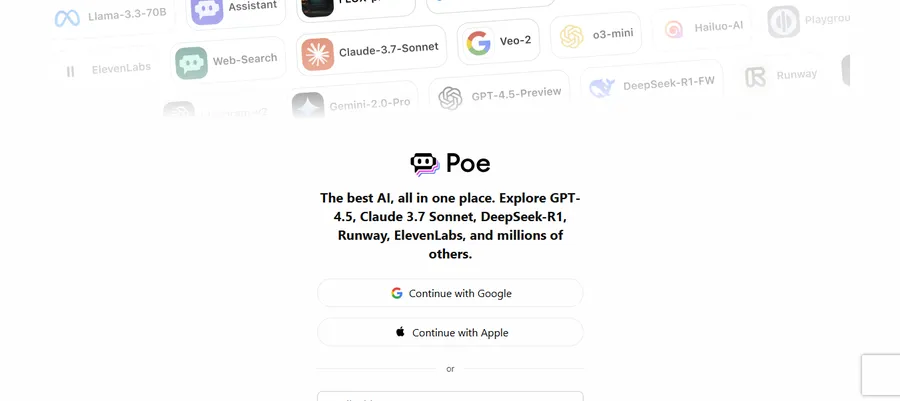
Poe isn’t a single AI model but rather a platform created by Quora that provides access to a wide variety of different AI chatbots from various developers (including models from OpenAI, Anthropic, Google, Meta, and more) all within one interface. It also allows users to create their specialized bots.
Pros: Easily compare outputs from multiple top-tier AI models side-by-side, discover thousands of user-created bots for specific tasks or fun, and often provides free (though limited) access to premium models.
Cons: Free usage typically involves daily message limits for each bot; the vast number of choices might feel slightly overwhelming for absolute beginners.
Ideal User: Users who enjoy experimenting and comparing different AI models, those looking for niche or specialized bots, and people wanting access to multiple AIs without juggling accounts. A versatile hub for finding your preferred ChatGPT alternative.
6. Meta Llama 3 Models
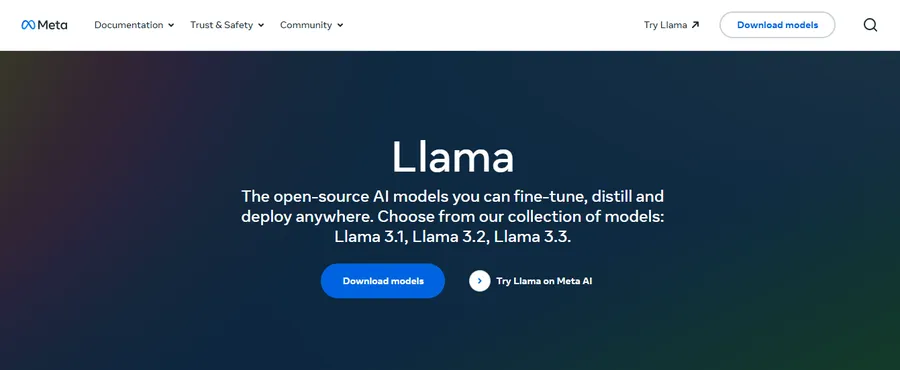
Llama 3 is Meta’s latest series of powerful open-source AI models, highly competitive with top closed-source models in benchmarks for reasoning, coding, and instruction following. While Meta offers access via Meta AI (region-dependent), Llama 3’s primary impact is its availability.
Pros: State-of-the-art performance for an open-source model, can be run locally (with technical know-how) for enhanced privacy, drives innovation, freely accessible via various third-party platforms.
Cons: No single, official, globally accessible chat website directly from Meta like the others (Meta AI is rolling out); requires using platforms like HuggingChat, Poe, Groq, or a local setup, which might be a barrier for non-technical users.
Ideal User: Developers, AI enthusiasts, users prioritizing open-source technology, and people accessing it via integrated platforms. It’s the engine behind many emerging ChatGPT alternatives.
7. Character.AI
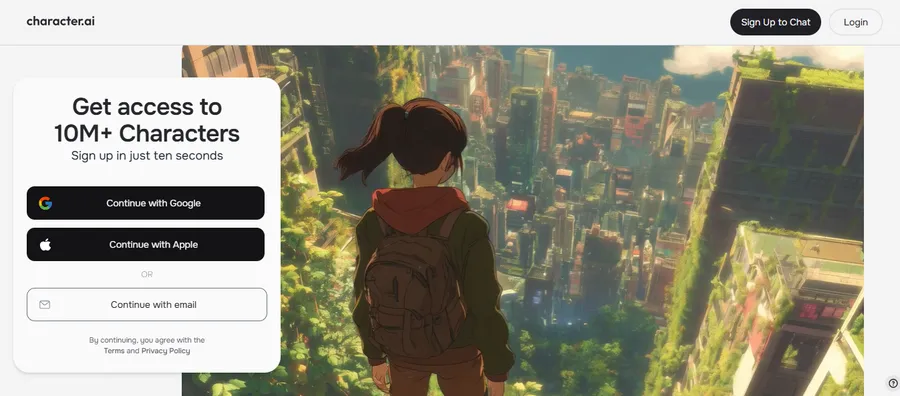
A unique and highly popular platform focused entirely on creating and interacting with AI-driven “Characters.” Users can chat with characters based on historical figures, fictional personalities, game characters, or create entirely new ones for role-playing and dynamic conversations using Character.AI.
Pros: Extremely engaging for creative storytelling, role-playing, and exploring different personas; vast library of user-created characters available; offers a very different kind of AI interaction; largely free to use.
Cons: Not suitable for factual accuracy, research, coding, or typical productivity tasks; its purpose is entertainment and conversational exploration.
Ideal User: Writers looking for character inspiration, gamers, hobbyists, anyone seeking fun, imaginative, and character-focused conversations rather than a productivity-oriented alternative to ChatGPT.
How To Find Great ChatGPT Alternatives Free of Charge?
A major draw for many users is finding powerful AI assistance without the subscription fees. So, can you find great ChatGPT alternatives free of charge? The answer is a definite yes! While the absolute top-tier features and highest usage limits are often reserved for paid plans, several platforms provide incredibly capable free versions.
It’s helpful to understand the “freemium” model common in this space. Free tiers usually come with some limitations compared to their paid counterparts. These might include:
- Usage Caps: Limits on the number of messages or queries you can make per day or hour (common with Claude, Poe, and Perplexity’s Pro searches).
- Model Access: You might use a slightly less powerful or older AI model (e.g., Gemini Free uses 1.5 Flash, Copilot might use GPT-4o mainly during non-peak hours).
- Feature Restrictions: Advanced features like deep data analysis, the largest context windows, or certain integrations might be locked behind a paywall.
- Slower Speeds: Responses might be slightly slower during peak times.
Despite these points, the value offered by free tiers is often substantial. Here are some standout free options worth considering:
- Google Gemini (Standard): Offers access to the capable Gemini Pro (or Flash) model, excels at real-time information via Google Search, and integrates well with Google Workspace. Often cited as a top free choice.
- Microsoft Copilot (Standard): Frequently provides free access to powerful models like GPT-4o (especially during off-peak hours), includes image generation via DALL-E 3, and integrates tightly with Windows and Edge.
- Claude (Free Tier): Typically runs on the sophisticated Claude 3.5 Sonnet model, excellent for nuanced writing and analysing text, though it usually has message limits and lacks direct web access.
- Perplexity AI (Free Tier): Fantastic for research, providing answers with clear source citations, though “Pro” searches are limited.
- Platforms like Poe or HuggingChat: These offer free (often with limits) access to a variety of different models, including open-source options like Llama 3, allowing you to experiment.
Pro Tip: Don’t limit yourself to just one! Leverage the strengths of multiple ChatGPT alternatives free. Use Perplexity for sourced research, Gemini for up-to-the-minute questions, Copilot for tasks within the Microsoft ecosystem, and Claude for refining long texts. Mixing and matching can give you comprehensive AI support without the cost.
Also, don’t forget that AI extends beyond chat tools. For example, if you’re interested in design and visuals, you can check out the best AI image generators to see how they compare against text-based AIs.
How to Choose the Right ChatGPT Alternative For You
With so many excellent options now available, picking the best ChatGPT alternative comes down to matching the tool to your specific needs. Here’s a straightforward approach to finding your ideal AI assistant:
- Identify Your Primary Use Case: What will you use the AI for most often? Is it creative writing, brainstorming, coding help, factual research that needs citations (like Perplexity provides), analyzing long documents (where Claude shines), or generating images? Knowing your main goal helps narrow down the choices significantly.
- Consider Your Budget: Are you looking strictly for free options, or is a subscription feasible? Many powerful ChatGPT alternatives free tiers exist (like standard Gemini, Copilot, or Claude). If considering paid plans, compare their costs ($10-$25/month is common) against the extra features, higher usage limits, or access to more advanced models they provide.
- Evaluate Key Features & Ease of Use: Beyond the basics, what functionalities matter to you? Think about:
- Accuracy & Reliability: How crucial is factual correctness and consistent performance for your tasks?
- Interface: Do you prefer a simple, intuitive design?
- Integrations: Does it need to connect smoothly with other tools you rely on (e.g., Google Workspace, Microsoft Office, specific coding environments)?
- Specific Capabilities: Do you need features like web browsing, image generation, voice input, multilingual support, or a very large context window for long texts?
- Privacy & Security: Review how the provider handles your data, especially if you’ll be inputting sensitive information.
- Test Drive: Don’t just read reviews – try them out! Most top contenders offer free tiers or trials. Spend time interacting with a few potential candidates. Ask them similar questions, give them typical tasks, and see which ChatGPT alternative feels most intuitive, provides the most useful responses for you, and fits best into your workflow.
Common Pitfalls When Switching from ChatGPT
Switching to a new AI tool can be exciting, but keep these common pitfalls in mind for a smoother experience:
- Expecting an Identical Twin: Remember that no ChatGPT alternative behaves exactly like ChatGPT. Each AI has its unique strengths, weaknesses, personality, and optimal prompting style. Embrace the differences rather than expecting a clone.
- Ignoring Privacy Policies: Different platforms have different approaches to data privacy. Before inputting sensitive personal or business information, take a quick look at the alternative’s privacy policy to understand how your data might be used.
- Underestimating the Learning Curve: While most chatbots are designed to be user-friendly, allow yourself a little time to adjust. You might need to learn a new interface, discover different features, or slightly adapt how you write prompts to get the best results from your chosen alternative to ChatGPT.
Conclusion
As we’ve seen, numerous powerful ChatGPT alternatives offer unique strengths, catering to diverse needs and budgets – from Google Gemini’s real-time prowess to Claude’s textual analysis and Perplexity’s sourced research.
Finding the right alternative to ChatGPT ultimately depends on your specific requirements and workflow. Don’t hesitate to experiment with the free tiers and trials available. The perfect AI partner for you is out there!
Which ChatGPT alternative are you most excited to try, or which one has already become your go-to? Share your thoughts and experiences in the comments below!
FAQs About The Best ChatGPT Alternative Tools
Q1: What is the single best ChatGPT alternative?
A: There's no single "best" one for everyone. It depends entirely on your needs. For general use and Google integration, Google Gemini is a strong choice. For research with sources, Perplexity AI excels. For safety-focused interaction and long text, Claude is great. Microsoft Copilot is ideal for Windows/Microsoft ecosystem users. The best approach is to try a few based on this guide!
Q2: Are there any truly free ChatGPT alternatives with unlimited use?
A: Most high-performance AI models have significant running costs. Therefore, truly free and unlimited access to the most powerful versions is rare. However, many ChatGPT alternatives free tiers (like standard Gemini, Claude, Copilot, Perplexity) are very generous and perfectly usable for many tasks, though they might have usage caps, use slightly less advanced models, or lack premium features.
Q3: Is Gemini or Claude better than ChatGPT?
A: "Better" is subjective. Gemini might be better for real-time info, Claude for handling long documents or its safety focus, and ChatGPT (especially GPT-4) might still excel in certain creative writing or complex reasoning tasks. They are different tools with different strengths – making them valuable alternatives to ChatGPT, not necessarily direct replacements in all aspects.
Q4: Can I use these alternatives to ChatGPT for my business?
A: Generally, yes, but it's crucial to check the specific terms of service for each ChatGPT alternative, especially regarding commercial use, data privacy, and output ownership. Paid tiers often come with clearer commercial usage rights.
Read more: DeepSeek vs ChatGPT: How Do They Compare?


